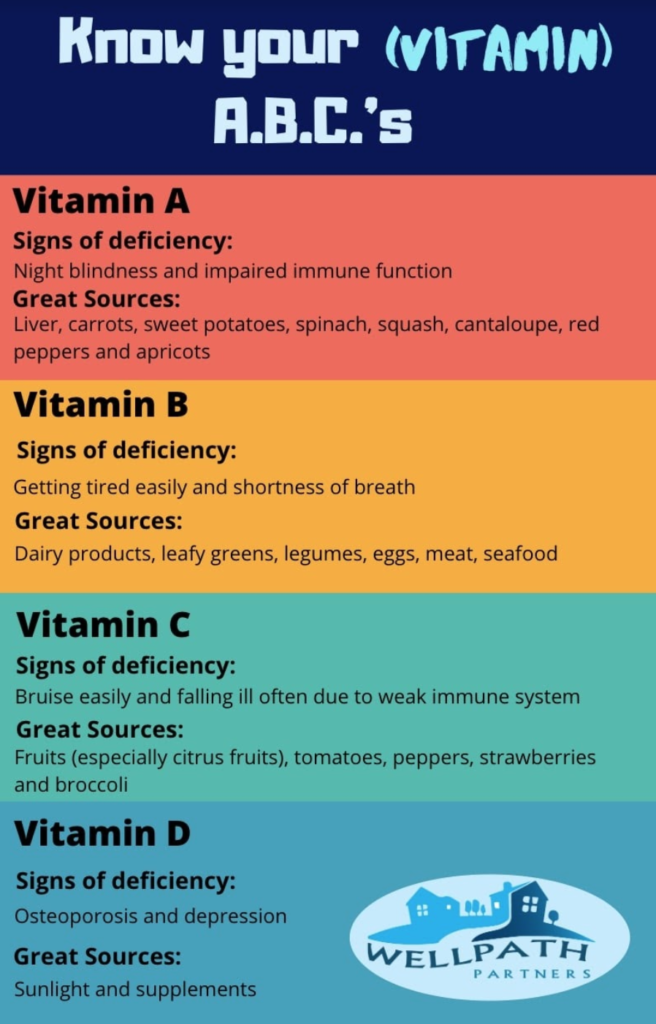
We’ve all heard of the variety of vitamins and the importance of getting them all for good health. Many spend hundreds of dollars on daily supplements, fruits, and vegetables. But what are vitamins anyway, and how do they work? Vitamins are essential nutrients needed in small quantities to properly maintain metabolism. While vitamins are naturally produced in all living organisms, the body doesn’t produce enough and thus requires more nutritious foods. Without certain vitamins, one may experience specific health difficulties. Here is a guide to help you better understand your nutritional facts:
Vitamin A
Signs of deficiency: night-blindness and keratomalacia, an eye disorder that results in a dry cornea.
Great sources: liver, cod liver oil, carrots, broccoli, sweet potato, butter, kale, spinach, pumpkin, collard greens, some cheeses, egg, apricot, cantaloupe melon, and milk.
Vitamin B
Signs of deficiency: poor circulation to body and brain.
Great sources: yeast, pork, cereal grains, sunflower seeds, brown rice, whole-grain rye, asparagus, kale, cauliflower, potatoes, oranges, liver, and eggs.
Vitamin B2
Signs of deficiency: sores on the mouth.
Great sources: asparagus, bananas, persimmons, okra, chard, cottage cheese, milk, yogurt, meat, eggs, fish, and green beans
Vitamin B3
Signs of deficiency: Diarrhea, dermatitis, and mental disturbance.
Great sources: liver, heart, kidney, chicken, beef, fish (tuna, salmon), milk, eggs, avocados, dates, tomatoes, leafy vegetables, broccoli, carrots, sweet potatoes, asparagus, nuts, whole-grains, legumes, mushrooms, and brewer’s yeast.
Vitamin B5
Signs of deficiency: Paresthesia or “pins and needles.”
Great sources: meats, whole-grains (milling may remove it), broccoli, avocados, royal jelly, and fish ovaries.
Vitamin B6
Signs of deficiency: Anemia or damage to parts of the nervous system other than the brain and spinal cord.
Great sources: meats, bananas, whole-grains, vegetables, and nuts. When milk is dried, it loses about half of its B6. Freezing and canning can also reduce content.
Vitamin B7
Signs of deficiency: Dermatitis or Inflammation.
Great sources: egg yolk, liver, some vegetables.
Vitamin B12
Signs of deficiency: Megaloblastic anemia, a condition where bone marrow produces unusually large, abnormal, immature red blood cells.
Great sources: fish, shellfish, meat, poultry, eggs, milk and dairy products, some fortified cereals and soy products, as well as fortified nutritional yeast.
Vitamin C
Signs of deficiency: Megaloblastic anemia.
Great sources: vegetables and fruits (especially citrus fruits).
Vitamin D
Signs of deficiency: Osteoporosis or softening of the bones.
Great sources: sunlight exposure, fatty fish, eggs, beef liver, and mushrooms.
Vitamin K
Signs of deficiency: an unusual susceptibility to bleeding.
Great sources: leafy green vegetables, avocado, kiwi fruit. Parsley contains a lot of vitamin K, too.
Due to a lack of understanding vitamins, millions of seniors are not consuming the necessary amount of vitamins for healthy growth and metabolism. Understandably, cooking for oneself is difficult in old age. Sometimes it may be difficult to incorporate these vitamins in one’s daily meals, so supplements are needed. If your loved one is experiencing any signs of deficiency, please consult their primary care physician for a consultation. Seniors can greatly benefit from the personalized meals provided at the different senior living options. WellPath Partners can connect any aging loved one with board and care homes, memory care facilities, and assisted living communities which offer personalized menus and scheduled meal plans to maintain nutrition and regularity without facing the stresses of planning and grocery shopping. Contact WellPath Partners today to learn more.
By Prithvi Chauhan
WellPath Partners is your senior resource referral guide. Follow us on ALL social media platforms and join us weekly for more content and public health discussions.
